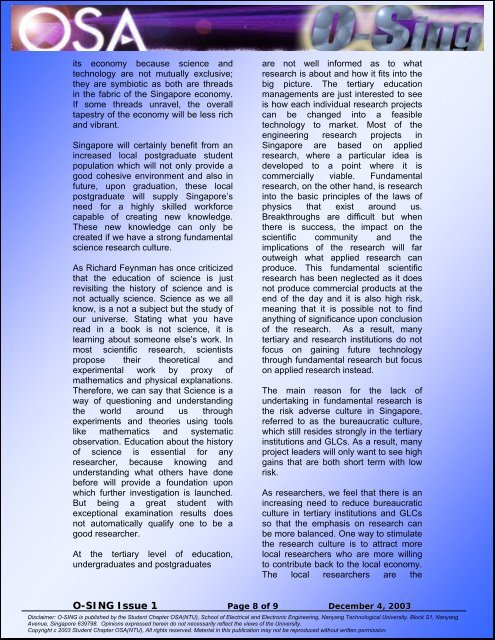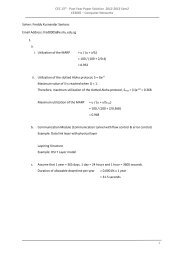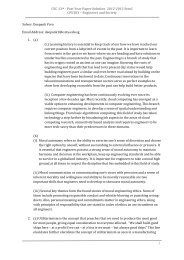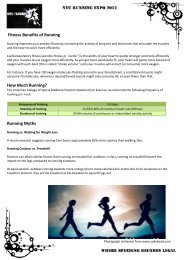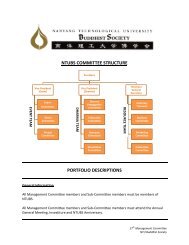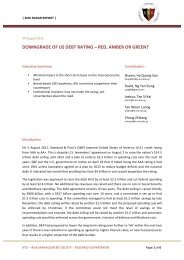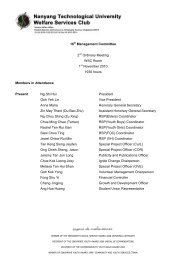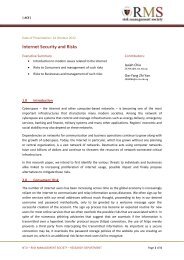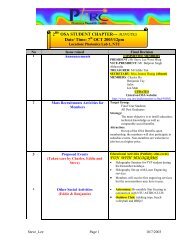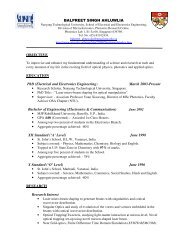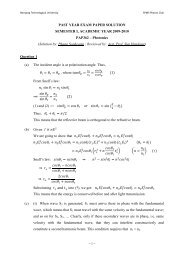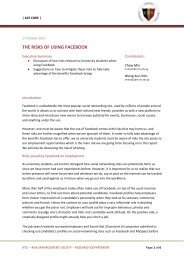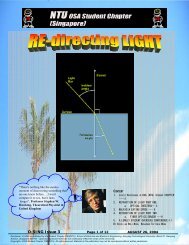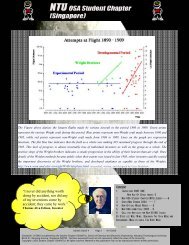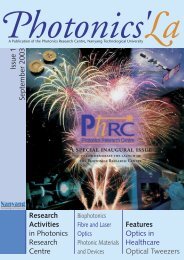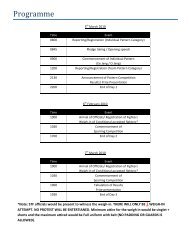1st ISSUE,November 2003 - Nanyang Technological University
1st ISSUE,November 2003 - Nanyang Technological University
1st ISSUE,November 2003 - Nanyang Technological University
Create successful ePaper yourself
Turn your PDF publications into a flip-book with our unique Google optimized e-Paper software.
its economy because science and<br />
technology are not mutually exclusive;<br />
they are symbiotic as both are threads<br />
in the fabric of the Singapore economy.<br />
If some threads unravel, the overall<br />
tapestry of the economy will be less rich<br />
and vibrant.<br />
Singapore will certainly benefit from an<br />
increased local postgraduate student<br />
population which will not only provide a<br />
good cohesive environment and also in<br />
future, upon graduation, these local<br />
postgraduate will supply Singapore’s<br />
need for a highly skilled workforce<br />
capable of creating new knowledge.<br />
These new knowledge can only be<br />
created if we have a strong fundamental<br />
science research culture.<br />
As Richard Feynman has once criticized<br />
that the education of science is just<br />
revisiting the history of science and is<br />
not actually science. Science as we all<br />
know, is a not a subject but the study of<br />
our universe. Stating what you have<br />
read in a book is not science, it is<br />
learning about someone else’s work. In<br />
most scientific research, scientists<br />
propose their theoretical and<br />
experimental work by proxy of<br />
mathematics and physical explanations.<br />
Therefore, we can say that Science is a<br />
way of questioning and understanding<br />
the world around us through<br />
experiments and theories using tools<br />
like mathematics and systematic<br />
observation. Education about the history<br />
of science is essential for any<br />
researcher, because knowing and<br />
understanding what others have done<br />
before will provide a foundation upon<br />
which further investigation is launched.<br />
But being a great student with<br />
exceptional examination results does<br />
not automatically qualify one to be a<br />
good researcher.<br />
At the tertiary level of education,<br />
undergraduates and postgraduates<br />
are not well informed as to what<br />
research is about and how it fits into the<br />
big picture. The tertiary education<br />
managements are just interested to see<br />
is how each individual research projects<br />
can be changed into a feasible<br />
technology to market. Most of the<br />
engineering research projects in<br />
Singapore are based on applied<br />
research, where a particular idea is<br />
developed to a point where it is<br />
commercially viable. Fundamental<br />
research, on the other hand, is research<br />
into the basic principles of the laws of<br />
physics that exist around us.<br />
Breakthroughs are difficult but when<br />
there is success, the impact on the<br />
scientific community and the<br />
implications of the research will far<br />
outweigh what applied research can<br />
produce. This fundamental scientific<br />
research has been neglected as it does<br />
not produce commercial products at the<br />
end of the day and it is also high risk,<br />
meaning that it is possible not to find<br />
anything of significance upon conclusion<br />
of the research. As a result, many<br />
tertiary and research institutions do not<br />
focus on gaining future technology<br />
through fundamental research but focus<br />
on applied research instead.<br />
The main reason for the lack of<br />
undertaking in fundamental research is<br />
the risk adverse culture in Singapore,<br />
referred to as the bureaucratic culture,<br />
which still resides strongly in the tertiary<br />
institutions and GLCs. As a result, many<br />
project leaders will only want to see high<br />
gains that are both short term with low<br />
risk.<br />
As researchers, we feel that there is an<br />
increasing need to reduce bureaucratic<br />
culture in tertiary institutions and GLCs<br />
so that the emphasis on research can<br />
be more balanced. One way to stimulate<br />
the research culture is to attract more<br />
local researchers who are more willing<br />
to contribute back to the local economy.<br />
The local researchers are the<br />
O-SING Issue 1 Page 8 of 9 December 4, <strong>2003</strong><br />
Disclaimer: O-SING is published by the Student Chapter OSA(NTU), School of Electrical and Electronic Engineering, <strong>Nanyang</strong> <strong>Technological</strong> <strong>University</strong>. Block S1, <strong>Nanyang</strong><br />
Avenue, Singapore 639798. Opinions expressed herein do not necessarily reflect the views of the <strong>University</strong>.<br />
Copyright c <strong>2003</strong> Student Chapter OSA(NTU), All rights reserved. Material in this publication may not be reproduced without written permission.


